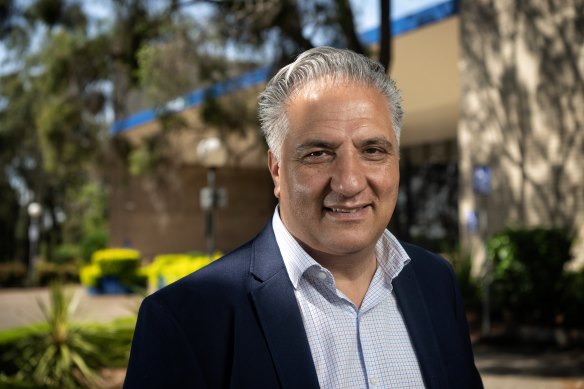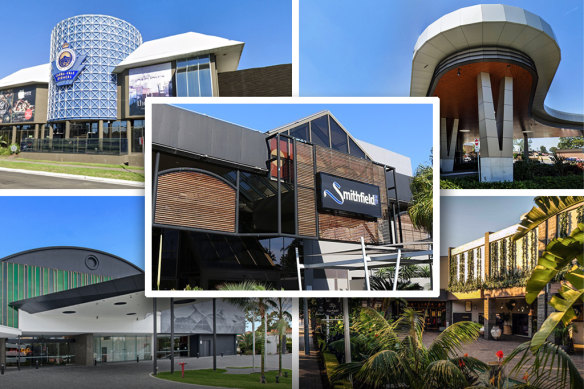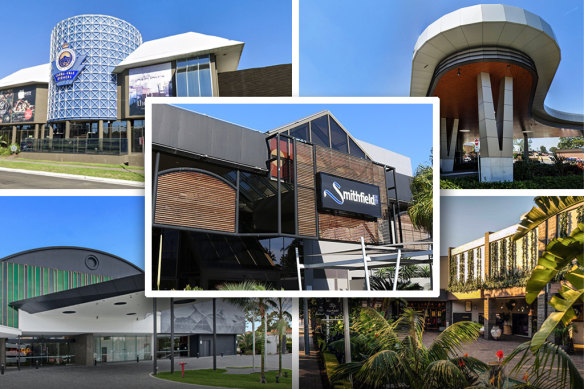The mayor of the Sydney local government area with the second-highest poker machine losses in NSW wants registered clubs to pay a super tax on gambling profits over $20 million, following revelations the biggest grants distributed by high-revenue clubs last year were poured back into their own operations.
Fairfield City Mayor Frank Carbone has written to Premier Chris Minns highlighting that five clubs in his municipality – the most disadvantaged LGA in NSW – have a combined income higher than Australia Post, yet the most they have to pay in gaming taxes is 26.55 per cent on profits over $5 million per quarter.

Fairfield City Mayor Frank Carbone says local communities would get more value from gaming revenue from a tax on clubs than a grants program.Credit: Nick Moir
The top tax rate for hotels is 50 per cent of gaming revenue over $1.25 million per quarter.
“I’m not against clubs, they do a lot of great work, but it’s not about that,” Carbone said. Communities would get better value from a tax on clubs that raised money for local infrastructure than they do from the current grants scheme, he said.
“Clearly, our area has a gambling problem. It has a big social impact. My view is there should be more money for the local community.”
ClubsNSW said in a statement that clubs already paid $1.4 billion in state and federal taxes.

Mayors want registered clubs to pay a super tax on gambling profits over $20 million.Credit:
“Unlike other hospitality venues, clubs are owned by the community, with profits going back into the community or into the upgrade of members’ facilities, rather than the pockets of shareholders or owners,” the statement said.
“It is also worth noting that since The Star was granted its most recent tax relief, more than 40 of the largest clubs in NSW have a higher tax rate than the casinos.”
Under the Carbone proposal, clubs making more than $20 million annual profit would be levied with a 10 per cent tax on their gaming revenue, with the proceeds spent on reviving the night-time economy at non-gambling venues within the same local government area, along with sporting infrastructure.
Three local government areas accounted for a third of Sydney’s losses on poker machines in the first half of 2023, with daily losses of $1.8 million in Canterbury-Bankstown, $1.7 million in Fairfield and $1.3 million in Cumberland, according to an analysis by the Centre for Western Sydney.
Cumberland councillor Steve Christou, speaking on his own behalf, supported a tax increase on clubs making a large amount of money from poker machines.
“I’m of the strong opinion that clubs are not paying their fair share,” Christou said.
“Although we’re thankful for what they do pay, they could be paying a lot more. My feeling is a lot of councils and sporting groups are afraid to come out and speak in favour of more funding for fear they might be blacklisted for grants.”
Liverpool Mayor Ned Mannoun agreed the money raised from gambling taxes in any given LGA should be spent within that community, though the amount lost on poker machines in his area was only a third of the amount lost in Fairfield.
“Fairfield does the heavy lifting and I don’t think they get compensated fairly,” Mannoun said.
Canterbury-Bankstown Council referred questions about the scheme back to ClubsNSW.
Clubs are allowed to claim a tax benefit if a proportion of their profits over $1 million are donated to welfare, social services and community development projects, under the ClubGRANTS scheme.
The NSW government is currently reviewing ClubGRANTS to determine whether it provides cost-effective benefits for communities, is appropriately taxed, fit for purpose and meets contemporary standards.
Data released for the first time earlier this month showed that clubs were awarding the largest grants under the scheme to their own operations or those of their subsidiaries. They donated $121 million in 2023, of which $71 million could be claimed as a tax benefit.
Local councils are a significant stakeholder in the program because their representatives sit on the local advisory committees that make recommendations on how funding should be distributed. But individual clubs are not obliged to follow the recommendations.
Lake Macquarie Council pulled out of the program in 2014 due to the unwillingness of local clubs to follow council’s advice and subsequent ranking of applications. “Some may have provided funding in line with the recommendations; however, most did not,” a council spokesman said.
Local Government NSW, an independent organisation that lobbies on behalf of councils, passed a resolution on Monday night that supported the local administration and delivery of ClubGRANTS, and opposed the funding being paid into consolidated revenue.
The resolution referred to the funding category that distributes money to local groups and charities, but was silent on the category that allows clubs to direct tax-deductible grants back into their own operations.
Start the day with a summary of the day’s most important and interesting stories, analysis and insights. Sign up for our Morning Edition newsletter.
